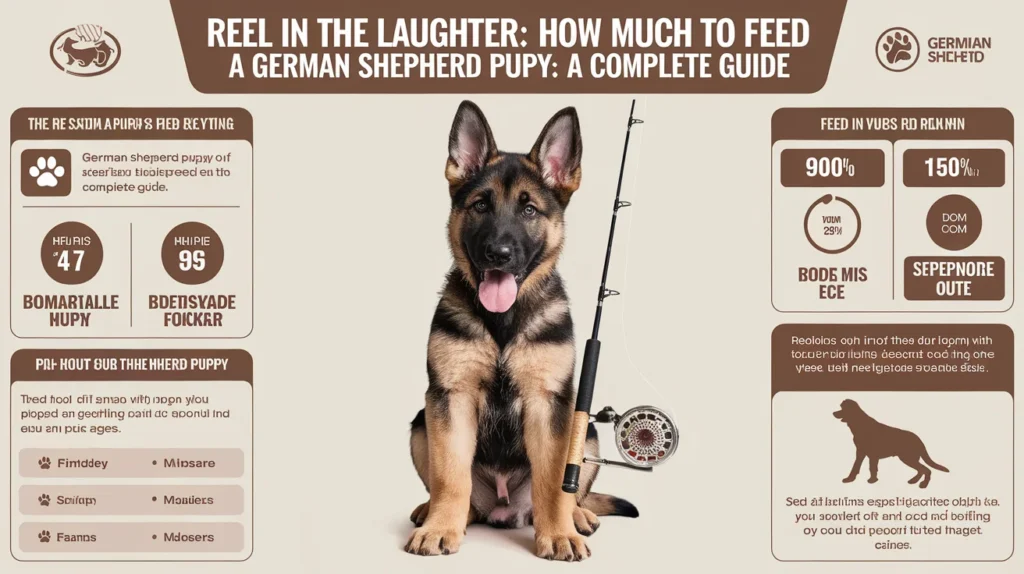German Shepherd puppies are energetic, loyal, and fast-growing, requiring the right nutrition for their development. As a pet parent, understanding how much to feed a German Shepherd puppy is crucial for their health, growth, and energy levels. In this guide, we’ll cover everything from portion sizes to feeding schedules, ensuring you have all the information you need to make the best choices for your furry friend.
Why Is Proper Feeding Important for German Shepherd Puppies’ Growth and Health?
Feeding a German Shepherd puppy appropriately is critical because these pups experience rapid growth during their first year. Poor nutrition can lead to health problems such as joint issues, malnutrition, or obesity. A well-fed puppy will grow into a strong, active adult dog with a healthy weight and robust immune system.
How Do You Determine the Right Amount of Food for German Shepherd Puppies?
The right amount of food depends on factors like age, weight, and activity level. Puppies under six months eat more frequently, while older ones eat less often but in larger quantities. Veterinarians or breeders often recommend dividing the daily food into multiple meals to prevent overfeeding or digestive issues.
What Is the Ideal Feeding Schedule for German Shepherd Puppies?
A German Shepherd puppy’s feeding schedule changes as they grow:
- 8-12 weeks old: Feed four small meals daily.
- 3-6 months old: Reduce to three meals per day.
- 6-12 months old: Transition to two meals daily.
- Over 12 months: Adult dogs usually eat twice a day.
Example: For a 10-week-old puppy, offer breakfast at 7 AM, lunch at 12 PM, dinner at 5 PM, and a late-night snack at 9 PM.
What Types of Food Are Best for German Shepherd Puppies?
Choosing the right type of food is critical. High-quality puppy-specific food ensures balanced nutrition with proper protein, fat, and carbohydrate ratios. Here are common options:
- Dry Kibble: Convenient and supports dental health.
- Wet Food: More palatable and hydrating but can be costly.
- Raw Diet: Includes raw meats, bones, and veggies but requires careful preparation.
- Homemade Diet: Balanced recipes must be veterinarian-approved.
Pro Tip: Always check for the AAFCO (Association of American Feed Control Officials) label to ensure the food meets nutritional standards.
How Do You Transition a German Shepherd Puppy to New Food?
Sudden changes in diet can upset your puppy’s stomach. Gradual transitions over 7-10 days help avoid digestive issues. Follow these steps:
- Start by mixing 25% new food with 75% old food for two days.
- Increase the new food to 50% for the next three days.
- Move to 75% new food for two days before switching entirely.
How Much Protein and Fat Should Be in German Shepherd Puppy Food?
German Shepherd puppies need high-protein diets to support their growing muscles. Look for food containing:
- Protein: At least 22% for growth.
- Fat: Around 8% for energy and coat health.
Omega-3 and Omega-6 fatty acids are essential for healthy skin and fur. Avoid foods with excessive fillers or low-quality ingredients.
What Are the Signs of Overfeeding or Underfeeding Your German Shepherd Puppy?
Overfeeding can lead to obesity, while underfeeding might cause malnutrition. Watch for these signs:
- Overfeeding: Weight gain, low energy, and loose stools.
- Underfeeding: Visible ribs, lethargy, and poor coat quality.
Tip: Adjust portion sizes if you notice any of these signs and consult your vet.
How Do Activity Levels Affect German Shepherd Puppies’ Feeding Needs?
Active German Shepherd puppies burn more calories and may need additional food to fuel their energy. Less active puppies require fewer calories to maintain a healthy weight.
Example: If your puppy enjoys daily walks and playtime, they might need 10-20% more food than a sedentary puppy.
Can You Use Treats as Part of a German Shepherd Puppy’s Diet?
Treats are great for training but should not exceed 10% of daily calorie intake. Opt for healthy treats like carrots, apple slices (without seeds), or store-bought training treats.
How Do You Ensure Your German Shepherd Puppy Stays Hydrated?
Water is essential for digestion, nutrient absorption, and overall health. Ensure your puppy has access to fresh, clean water at all times. Puppies eating dry kibble may drink more water than those on wet or raw diets.
Conclusion
Feeding a German Shepherd puppy involves understanding their nutritional needs, growth stages, and activity levels. With the right balance of high-quality food, proper portion sizes, and a consistent feeding schedule, your puppy will grow into a healthy and happy adult dog. Regularly consult your vet to adjust feeding as needed.
Remember, your care directly impacts your puppy’s health and happiness. With this guide, you can confidently provide the nutrition your German Shepherd puppy needs to thrive!

